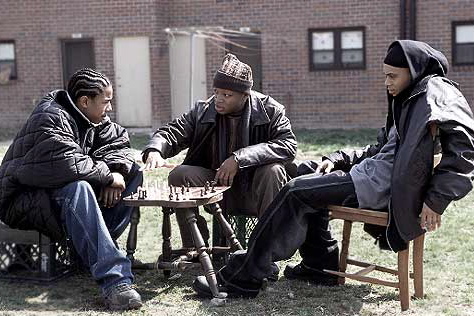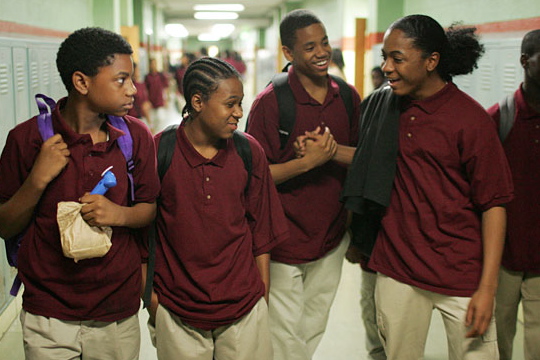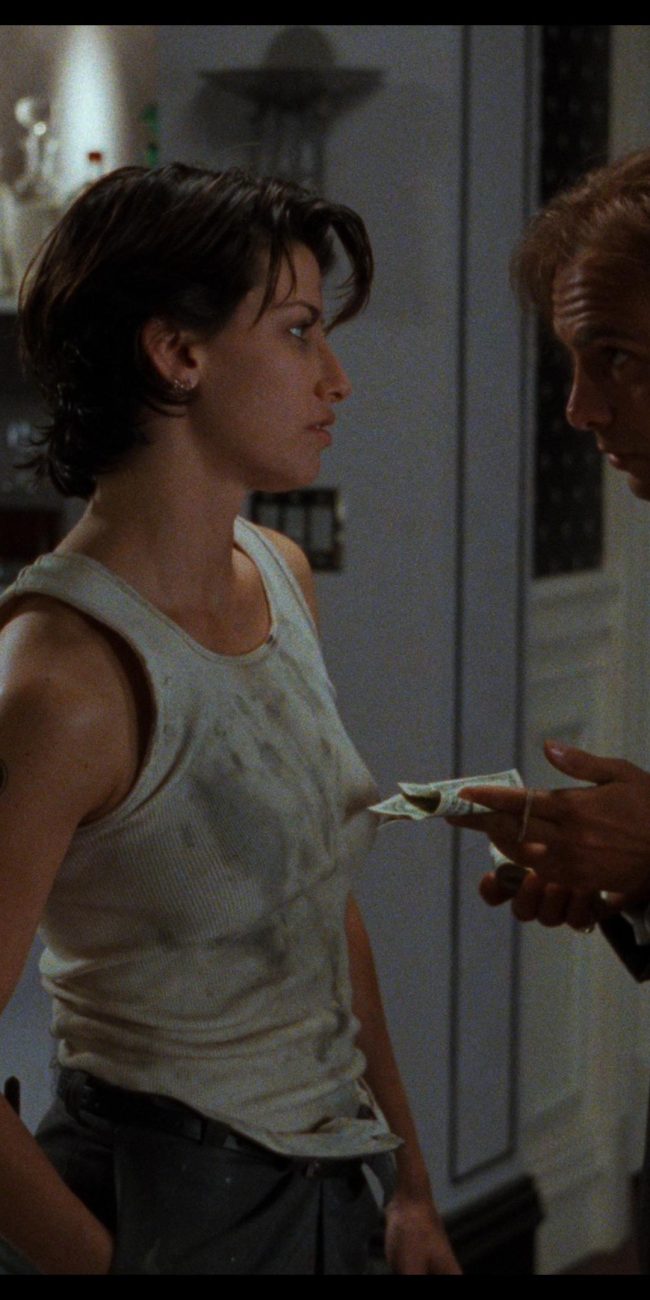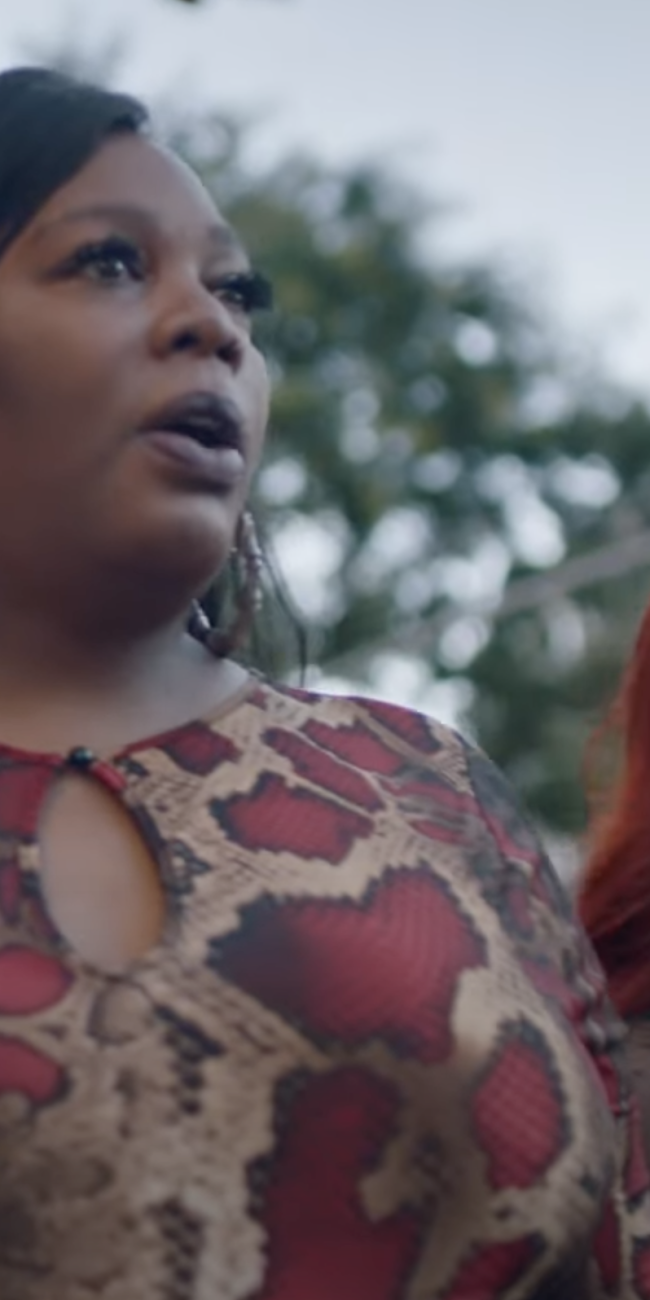(Season Five of The Wire can be purchased through Amazon, as can The Wire: Truth Be Told, the book by Wire staff writer Rafael Alvarez from which the David Simon quotation below is taken. Simon and Burns’ new miniseries Generation Kill, based on Evan Wright’s book, is currently running on HBO; details can be found here.)
Like any great work of art, The Wire can’t be reduced to a simple moral or message. It has many messages, none of them simple. Perhaps the most important thing it has to tell us is this: we’re not all alike under the skin. Despite our society’s well-intentioned liberal pieties about equality, there are, in fact, two kinds of people in this world, two basic groups, and one group really is superior to the other. There are those who know and love The Wire, and then there are the rest of you sorry-ass chumps.
But not to worry. We at H2N are here to lead you out of the darkness. So, in commemoration of the August 12th release of the fifth and final season on DVD—and in the interest of serving the community—we offer the following Wire FAQs for Beginners.
Q. The basics, please. Who, what, when…
The Wire is a one-hour drama, created by David Simon and his writing partner Edward Burns, that ran on HBO for five seasons between 2002 and 2008. Simon is a former Baltimore Sun reporter and author of the nonfiction books Homicide and The Corner. Burns, a Baltimore police detective Simon wrote about in Homicide, helped Simon research and write The Corner after retiring from the force. Barry Levinson and Tom Fontana invited Simon to join their writing staff when they adapted Homicide into a network series; when the show ended, Simon, tiring of the standards-and-practices restrictions imposed by the broadcast networks, pitched The Corner to HBO as a miniseries. The miniseries was a success, and HBO approved Simon’s proposal for The Wire. Over the course of the series’ run, the writing team included, apart from the two creators/mainstays, the acclaimed crime novelists Dennis Lehane, George Pelecanos, and Richard Price.
Q. What is The Wire about?
About sixty hours. Ha!
The Wire is an ensemble show. There’s no central protagonist. There are literally dozens of important characters. It’s ostensibly a cop show, or a cops-and-crooks show—the title refers to the surveillance techniques used by the police—but really it’s a panoramic study of a modern American city. Crucially, the series was planned with a five-season arc from the beginning; it was always meant to end after Simon and company finished telling the story they had planned. The first season focused on the attempts of the Baltimore PD’s Major Crimes Unit to take down the Barksdale gang, a crew of crack dealers dominating the local drug trade. The second season expanded to take in the Baltimore dockworkers’ struggles to resist their impending obsolescence. The third saw the return of the Barksdale gang and also brought to the surface a sub-topic from the first two seasons, Baltimore electoral politics. The fourth introduced a new group of characters, a quartet of adolescent boys, and a new setting, the Baltimore public-education system. The fifth closed out the series with a storyline involving the newspaper business.
 The show looks at the city as if it were a living organism made up of smaller organisms—institutions and organizations such as the drug crews, the police department, the longshoremens’ union, the schools, the newspapers. Each institution or organization can in its turn be seen as a collection of individuals, all working to keep the institution up and running. Each institution has its hierarchy, but even the top dogs are more servant than master, the real master being the institution itself. Everyone, from police chief to beat cop, kingpin to corner boy, is only a misstep away from being cast out, cut off, or cut down. Sometimes an individual can go against the institution he or she is part of, for a little while: a drug lord can try to escape jail or death by funneling his money into legit enterprises; a police captain can legalize drugs in one neighborhood, in order to reduce violent crime; an idealistic mayoral candidate can attempt to circumvent the horse-trading and back-scratching of the political process. But sooner or later, the institution wins. Simon has stated that The Wire resembles a classical Greek tragedy, but with the institutions taking the place of the gods—those cruelly implacable masters of our destinies. And as that blind motherfucker eventually learned, you can’t cheat your destiny. Or as a 20th-century saying had it, you can’t fight City Hall. Or as Omar, The Wire’s beloved stick-up kid and avenging angel, put it (though the line could have been spoken by any number of characters): “All in the game, yo. All in the game.”
The show looks at the city as if it were a living organism made up of smaller organisms—institutions and organizations such as the drug crews, the police department, the longshoremens’ union, the schools, the newspapers. Each institution or organization can in its turn be seen as a collection of individuals, all working to keep the institution up and running. Each institution has its hierarchy, but even the top dogs are more servant than master, the real master being the institution itself. Everyone, from police chief to beat cop, kingpin to corner boy, is only a misstep away from being cast out, cut off, or cut down. Sometimes an individual can go against the institution he or she is part of, for a little while: a drug lord can try to escape jail or death by funneling his money into legit enterprises; a police captain can legalize drugs in one neighborhood, in order to reduce violent crime; an idealistic mayoral candidate can attempt to circumvent the horse-trading and back-scratching of the political process. But sooner or later, the institution wins. Simon has stated that The Wire resembles a classical Greek tragedy, but with the institutions taking the place of the gods—those cruelly implacable masters of our destinies. And as that blind motherfucker eventually learned, you can’t cheat your destiny. Or as a 20th-century saying had it, you can’t fight City Hall. Or as Omar, The Wire’s beloved stick-up kid and avenging angel, put it (though the line could have been spoken by any number of characters): “All in the game, yo. All in the game.”
Of course, we’re talking deep meanings and hidden themes here. But it’s the stories, and especially the characters, that draw you in. The depth and variety of characterization on The Wire are astonishing. Virtually all the recurring characters—and there are, again, dozens of important ones—are worlds unto themselves. They grow over the course of the series, they reveal unexpected layers and nuances, they make choices that will alternately lift your spirits, or crush them. (More of the latter, since for all its exuberance and humor, this is a pretty grim show.) And no TV series has ever been blessed with so many gifted actors.
Q. Should I start with the new Season Five DVD set?
No more than you would read a novel by starting with the last chapter. The Wire is an unfolding serial, and must be watched from Episode One of Season One. It won’t make sense otherwise. A couple of years back, when the show’s critical buzz hit critical mass and phrases like “best TV show ever” became common currency, a lot of people tuned in to see what the hype was about, watched an episode or two, and found they had no idea what was going on. Begin at the beginning.
 Q. Okay. So it’s very well written and well acted. But why do fans of the series talk about it as if it’s every American’s civic duty to watch it?
Q. Okay. So it’s very well written and well acted. But why do fans of the series talk about it as if it’s every American’s civic duty to watch it?
Because the show not only does what great fiction should, which is to entrance and delight, but also does what our journalists, politicians, and public intellectuals should do but usually fail to: it asks hard questions about why our cities are the way we are, why our schools are the way they are, why our political system is so wretched, why the poorest of us stay losing. And it refuses us the easy comfort of simple answers. The Wire addresses topics “ripped from the headlines,” as the cliché goes—the War on Drugs, the machinations of urban politics, the new models of police work, the slow destruction of American blue-collar life, gentrification, No Child Left Behind, journalism scandals at big-city newspapers, corporate downsizing, to name just a few—and grounds them in exquisitely detailed fictional reality: they’re the air the characters breathe, the circumstances they struggle against daily. Of course, many TV series play off current events, but even an expertly crafted police procedural like the Law & Order franchise operates by a kind of tabloid topicality: take an item from today’s New York Post, and work it up into a plot that can be neatly wrapped up in an hour, credits and commercials included. The Wire sees and hears more, thinks and feels more deeply, and has a lot more to say to us.
Q: For all the interesting programming on TV these days, much of it is still pretty unadventurous in terms of cinematic form and style—is The Wire any different?
In common with most good TV dramas, The Wire’s strong points are certainly its writing and acting, although its carefully wrought visual style is starting to receive some intelligent critical analysis: see here and here. But I’d argue that in one respect, the show pushes cinematic boundaries in ways that few movies ever do: the complexity of its narrative design actually stretches the viewer’s attention span. The storytelling is so intricate, the method of imparting information to viewers so subtle, and the storylines played out over such a great length, that our usual habits of absorbing a movie or TV show—figuring out who a character is, grasping the relevance of a turn in the plot, connecting one strand in the narrative with another—are extended and deepened. Let Simon tell it:
[W]e had it in mind that we would not explain everything to viewers. The show’s point of view was that of the insider, the proverbial fly on the wall—and we had no intention of impairing that point of view by pausing to catch up the audience. … Such calculating restraint offered viewers a chance to do something that television rarely, if ever, allows its audience: They were free to think hard about the story, the different worlds that the story presented, and ultimately, the ideas that underline the drama. And the reward for such committed viewers would come not at the end of a scene or the end of an episode, but at the end of the season, indeed, at the end of the tale.
In the passage just quoted, Simon was specifically referring to a moment in the fourth episode of the first season when a pair of detectives combs a murder scene looking for clues. And they find one. But the payoff of that scene—the piecing together of that particular puzzle—isn’t delivered until the final episode of the season, several hours of story-time later, and even then only glancingly, in the form of a knowing nod passed from one detective to another. Take another example of the show’s “calculating restraint”: in one episode, a high-ranking police official we’ve already come to know quite well, or so we think, is glimpsed in a gay bar. Blink and you might miss him. The narrative never comments any further on the man’s homosexuality, and we never learn anything more about his (presumably) closeted life as a gay man. But that little bit of information seeps into our understanding of who he is every time he appears afterward, much as it would if we were to learn that a co-worker or neighbor of ours were gay.
These are small examples, but multiply them by several hundred over the course of five seasons and you get a sense of how The Wire makes you work to think through its implications and tease out its meanings. I say “work” but it’s one of the show’s great pleasures: it pushes you to be a more alert, engaged viewer. I’ve never seen anything like it. For its breathtaking intelligence, its profound exploration of great social themes, and its unprecedented depth and humanity, the series will endure for decades, as a landmark in American culture and a standard of excellence in narrative film.
— Nelson Kim











